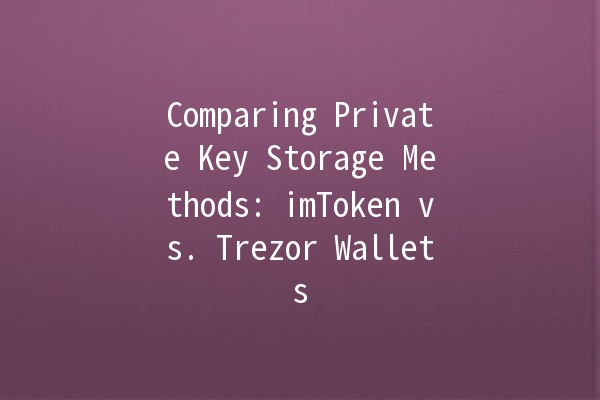In the everevolving world of cryptocurrency, safeguarding your assets is paramount. One of the most critical aspects of protecting your cryptocurrencies is the proper management and storage of private keys. This article delves into the private key storage methods of two popular wallets: imToken and Trezor. By examining their features, advantages, and potential drawbacks, readers can make informed decisions on which wallet best suits their needs.
Before we begin our comparison, it's essential to understand what private keys are. A cryptocurrency private key is a cryptographic password that allows users to access and manage their digital assets. Without this key, users cannot execute transactions or access their funds.
imToken is a mobile wallet that primarily focuses on convenience and user experience. Here are some of its key features:

Trezor, on the other hand, is a hardware wallet renowned for its security. Its key features include:
imToken stores private keys locally on the user's device. Here’s how it works:
Local Storage vs. Cloud Storage: imToken employs local storage on your mobile device, meaning that private keys are not stored on any remote server or cloud. This can enhance security, but it also requires users to maintain the health of their devices.
Encryption: The wallet encrypts private keys, adding an additional layer of protection against unauthorized access.
Trezor uses a hardwarebased approach for private key storage:
Offline Security: Private keys are stored within the device itself and remain offline, making them less susceptible to online threats.
Secure Element: The Trezor wallet has a dedicated secure component designed to protect private keys from physical and software attacks.
While using crypto wallets, users can employ certain strategies to enhance productivity and security. Here are five tips to help improve your experience:
Ensure that you regularly back up your wallet information. For imToken, this means exporting your private keys securely. For Trezor, make sure your recovery seed is safely stored. This way, if you lose access to your device, you can restore your funds without issues.
Implement multifactor authentication (MFA) on your accounts related to crypto transactions. This adds an extra layer of security to your wallet, especially for online accounts that manage your transactions.
Stay updated on best security practices. Knowing the latest scams, phishing attempts, and vulnerabilities will help you avoid potential pitfalls in managing your keys.
Always ensure that your wallet app (like imToken) and any related software (for example, Trezor's firmware) are up to date. Updates often include security patches that protect against new vulnerabilities.
Maintain separate wallets for daily transactions and longterm storage. For instance, imToken can be used for daily spending while Trezor can hold investment assets securely. This strategy minimizes risk and enhances the management of your digital assets.
imToken relies on local device storage, which is convenient but subject to mobile device vulnerabilities. In contrast, Trezor stores private keys offline in a secure hardware environment, providing an extra layer of security against online threats.
While imToken offers encrypted local storage, storing a substantial amount of cryptocurrency can be risky if your device is compromised. It’s advisable to utilize imToken for regular transactions and store larger sums in a hardware wallet like Trezor for enhanced security.
If you lose access to imToken, recovery depends on whether you have backed up your private keys or recovery phrase. Users should ensure this information is securely saved in advance to avoid permanent loss of funds.
Yes, Trezor supports a wide variety of cryptocurrencies. However, users should check the compatibility list on the Trezor website to ensure the specific tokens they plan to store are supported.
It's a good idea to back up your imToken wallet every time you make significant changes, such as adding new tokens or changing wallet settings. Regular backups help ensure you can recover your wallet quickly if needed.
While Trezor offers superior security, it’s essential to remember that users must still practice good security habits. This includes safeguarding recovery phrases and physically protecting the device from theft.
In summary, choosing between imToken and Trezor for managing private keys depends on individual preferences regarding convenience versus security. imToken offers accessibility and speed, while Trezor prioritizes robust security measures. Users should weigh these aspects carefully to select the right wallet for their cryptocurrency management needs.